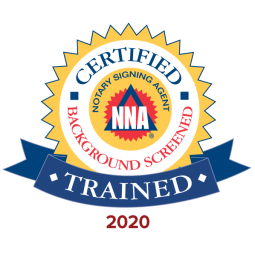The Most Common Types Of Notarizations
I am a member of the National Notary Association and I borrowed this article from the member site written By Kelle Clarke on August 13, 2015 in Notary News
Updated 8-11-20. Although Notaries are forbidden to choose the type of notarization for a signer, you need to know the difference between common notarial acts in order to perform your duties properly.
Acknowledgments
The purpose of an acknowledgment is to ensure that the signer of a document is who they claim to be and has voluntarily signed the document. Acknowledgments often are needed for documents concerning valuable assets, such as deeds, mortgages and deeds of trust.
To perform an acknowledgment, the signer must personally appear before you at the time of notarization to be positively identified and to declare — or "acknowledge" — that the signature on the document is their own and that they signed willingly.
While it is common practice for your client to sign the document in front of you at the time of the notarization, it is not necessary. Your client may sign the document before bringing it to you and declare — or acknowledge — to you that the signature on the document is theirs.
Jurats
The purpose of a jurat is for a signer to swear or affirm that the contents of a document are true. Depending on the jurisdiction, it also can be known as an affidavit or a verification on oath or affirmation.
For a jurat, the signer must personally appear before you and sign the document in your presence. You must then administer an oath or affirmation and have the signer speak aloud his or her promise that the statements in the document are true. The choice between an oath or affirmation should be made by the signer.
Administering the oath or affirmation is a vital part of performing a jurat or verification because the signer is affirming that the contents of the document are true, and he or she maybe prosecuted for perjury if the contents are not true. California requires a signer to provide proof of identity for a jurat.
Oaths/Affirmations
In some cases, a client may simply need you to administer an oath or affirmation orally, rather than as part of a jurat, affidavit or other written document. The purpose of administering a verbal oath or affirmation is, again, to compel a client to truthfulness.
An oath is a solemn pledge to a Supreme Being. An affirmation is a solemn pledge on the individual's personal honor. Again, the choice should be made by the signer.
Copy Certification
A copy certification confirms that a reproduction of an original document is a full, true, and accurate transcription or reproduction of the original.
Documents requiring copy certification may include: diplomas, driver’s licenses, leases, contracts, vehicle titles, Social Security cards, medical records and bills of sale.
To perform a copy certification, the person in possession of an original document (known also as the "document custodian") takes the original document to a Notary. The Notary typically will make a photocopy of the document and complete a certificate for the copy certification to confirm that the photocopy is a true, accurate and complete copy of the original.
While copy certifications are considered a common notarial act, nearly half of the U.S. states bar Notaries from performing this type of notarization. Make sure to check your state's guidelines to see if you may certify copies.
Of the states that do authorize this act, some stipulate that you may only certify copies of documents, not images, or other items. Other states allow Notaries to certify copies of both “records” and “items,” such as graphs, maps or images. California only allows Notaries to certify copies of powers of attorney or the Notary’s journal if requested by state officials or a court of law.
Kelle Clarke is a Contributing Editor with the National Notary Association.












